I was chatting with an author friend today about automated tools for checking spelling and grammar, whether they’re good enough to polish a work of fiction, and if we really need human editors and proofreaders in an AI-powered world.
I edit/proofread a million words a year for clients, and I read every single one of them. Yes, I have some automated tools that I use for a first pass, but I use them cautiously and selectively. Why, you might ask? Well, there are a few reasons.
Word Choice Matters
Number one, these tools are far from perfect. They’re evaluating your writing based on established patterns, common uses of language, and the context of neighboring words. Even the best AI-powered tools, fine-tuned for casual writing or works of fiction, can only make educated guesses. If you blindly accept every single recommendation, your writing is going to become an indecipherable mess. Think I’m exaggerating? Let me share a few real-life examples from stories I’ve run through spelling and grammar check software.
These first two are examples of tools suggesting word choices so wrong, they’re bizarre. We all know how erotic it is to have your criteria sucked, and I guess having someone breathed you instead of breed you is a novel form of birth control.
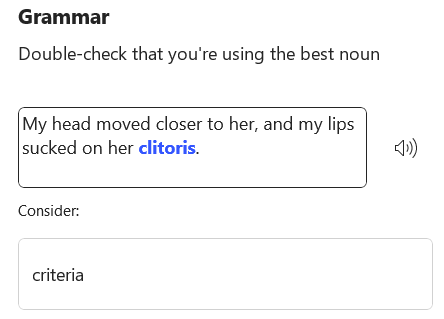
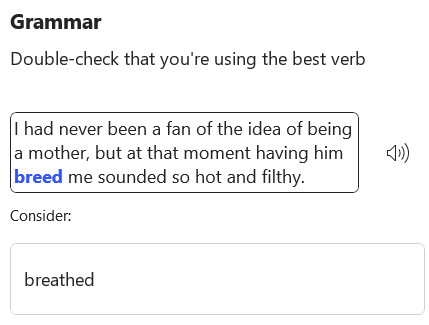
Perhaps you think those are anomalies, examples that I must have struggled to come up with. Nope. All the examples I’m sharing today came from quick checks of the first few pages of stories from 10 different authors. It’s nice to have someone who needs your breasts, but I’m sure we can all agree that kneading this is better, and given a choice of having someone cut down or cum down my throat, I’ll take the latter, please.
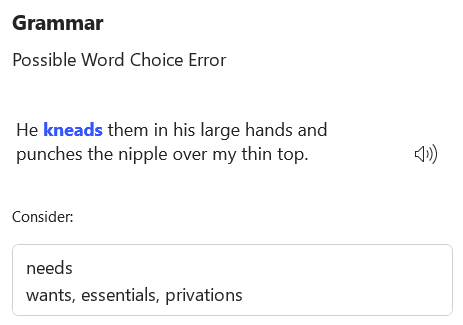
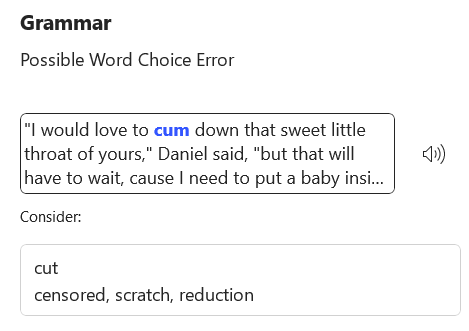
Surely you’re smart enough and careful enough not to let suggestions like that slip through, right? Perhaps, but by the time you’ve read your own work a dozen times or more, you tend to read what should be there rather than what is, and it’s easy to make the mistake of accepting the wrong changes – especially when it’s something that seems grammatically correct, but which changes the sense of your sentence entirely.
Yes, you can play alone or play along, but they mean very different things, and you can study with someone as well as you can study them, but participating and observing are not the same.
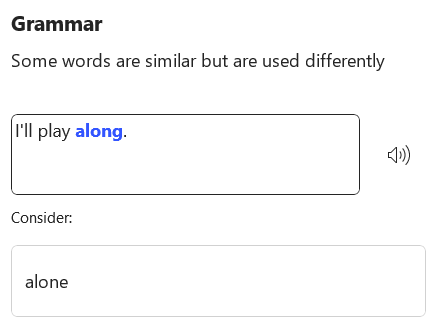

Tools can help, but they’ll never replace a human who reads every word, sentence, paragraph, and page, knowing how they connect and what they mean, not as isolated fragments of language, but as part of a story.
Dialogue and Slang: Grammar is Never Perfect
Formal language and grammar have their place, but so do informal grammar, casual language, and slang. We write one way for business, another for friends or family, and yet another for readers of stories. Similarly, we don’t speak the same way we write, and even if you’re neurodivergent like me, rehearsing and editing your words inside your head before you speak, you still don’t have the benefit of grammar-checking your conversations.
We say cause instead of because. We speak in fragments and run-on sentences. A pause for breath in narrative demands punctuation, but in dialogue we don’t have that luxury. We stumble over our words. We make tense mistakes, grammar errors, and more. A character in a horror story can speak in gibberish when being possessed, the protagonist in a thriller may be indecipherable after getting punched in the mouth, or a submissive in an erotic story may struggle to make themselves understood around a ball gag. “Ys ank ooo msrs” is entirely suitable for a gagged submissive saying, “Yes, thank you, Mistress,” but no tool is going to know that.
Some AI-powered tools can differentiate (to some extent) between casual and formal writing, and some try to acknowledge the freedom of dialogue, but only a human ear can ‘hear’ how your words sound.
Genre Has Its Own Complexities
Even if you could fine-tune a language tool to understand the complexities of casual writing and narrative writing, no two genres are entirely alike. Words that might be perfectly acceptable in one might read as out-of-place in another, and expressions that fit one genre do not always fit another.
Let’s take the example of come and cum in erotica. Generally, come is the act and cum is the fluid left over, but the words can be used interchangeably without readers batting an eye. In any other genre, cum is just plain wrong – unless you’re using it in the Latin sense. Or consider capitalization, where a BDSM story might refer to a master key or being the master of a skill, but also refer to being a Master. Any automated tool is going to flag the inconsistency, and no matter how you try to teach it what to ignore, it’ll never learn the difference.
For another example, consider interjections like ah, oh, hmm, or hmph. Those right there, the roots of the words, the shortest versions, are grammatically correct for just about any genre. Within fiction, however, especially romance, erotica, and horror, we regularly use onomatopoeia to capture sounds, turning ‘ah’ into ‘ahhhhh’ or ‘oh’ into ‘ohohohohohhhh,’ and readers are fine with that. Any tool out there is going to tell you that the extra letters are wrong – and sometimes they are just a typo – but it takes a human to read it in context and understand.
The Final Word
Tools are great for a first pass, for a sanity check, or just to clean up your manuscript for reading. They have value, and they have their place, but only when used correctly – and they’re no replacement for a human reader.
And that, of course, doesn’t even begin to get into the minefield that is AI and the training of large language models. Terms, conditions, and policies are often vague, with some tools allowing your content to be reused unless you opt out, some not giving you a choice, and others refusing to acknowledge whether they’re using your stories or not. There’s a reason companies like Google, Microsoft, and OpenAI are facing lawsuits. It’s one thing to risk exposing your own content, and another entirely to risk exposing your clients’ content.
On that note, I only use tools where I can confirm that content is not being reused under any conditions, and I pay close attention to any changes in terms and conditions – something not every writer using such tools casually has the time to do.
 newest »
newest »
 newest »
newest »
 Couldn't agree more, Sally. And strictly speaking, they're not AI. We don't have general AI yet. These are sophisticated computer programmes with complex algorithms. They don't have 'intelligence', only a set of rules they follow. The human brain is still capable of infinitely more complex editing choices. Excellent article, my dear!
Couldn't agree more, Sally. And strictly speaking, they're not AI. We don't have general AI yet. These are sophisticated computer programmes with complex algorithms. They don't have 'intelligence', only a set of rules they follow. The human brain is still capable of infinitely more complex editing choices. Excellent article, my dear!
 Violet wrote: "Couldn't agree more, Sally. And strictly speaking, they're not AI. We don't have general AI yet. These are sophisticated computer programmes with complex algorithms. They don't have 'intelligence',..."
Violet wrote: "Couldn't agree more, Sally. And strictly speaking, they're not AI. We don't have general AI yet. These are sophisticated computer programmes with complex algorithms. They don't have 'intelligence',..."








